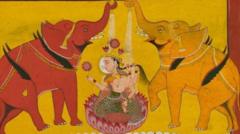Prince Karim Aga Khan, the 49th hereditary imam of the Ismaili Muslims, has passed away in Lisbon surrounded by family. His extensive charitable work spanned various sectors, and his wealth was rooted in both inheritance and business ventures, particularly in horse racing.
Aga Khan, Global Philanthropist and Spiritual Leader, Passes Away at 88

Aga Khan, Global Philanthropist and Spiritual Leader, Passes Away at 88
Prince Karim Aga Khan, a significant figure in philanthropy and Ismaili Islam, has died at age 88, as announced by his charity.
The Aga Khan Development Network, which oversees his numerous philanthropic efforts, confirmed his peaceful passing in a social media statement. Born in Switzerland and holding British citizenship, the Aga Khan's legacy extends beyond his religious leadership to his impactful charitable initiatives, including hospitals and educational programs, primarily in the developing world. He was a personal friend of King Charles III, who expressed profound sadness over the loss.
Having ascended to his role as imam at merely 20 years old in 1957, the Aga Khan played a crucial role in the Ismaili community, which numbers around 15 million globally, with significant populations in Pakistan, India, Afghanistan, and Africa. His wealth, which Forbes estimated at around $1 billion in 2008, was bolstered by interests like horse-breeding, where he notably owned the legendary racehorse Shergar.
The Aga Khan made substantial contributions to cultural and educational sectors, establishing famed institutions including the Aga Khan Foundation and the Aga Khan Trust for Culture. His initiatives facilitated landmark restoration projects and architectural awards. His influence extended to media in East and Central Africa with the founding of Nation Media Group.
Despite the personal loss of Shergar, who was kidnapped in 1983, the Aga Khan remained dedicated to the sport, reflecting on his achievements with pride. His racehorse victories included multiple wins at the Epsom Derby, showcasing his enduring passion for equestrian excellence. The Aga Khan's legacy will be felt across communities worldwide, as his charitable work continues to serve diverse populations irrespective of their backgrounds.
Having ascended to his role as imam at merely 20 years old in 1957, the Aga Khan played a crucial role in the Ismaili community, which numbers around 15 million globally, with significant populations in Pakistan, India, Afghanistan, and Africa. His wealth, which Forbes estimated at around $1 billion in 2008, was bolstered by interests like horse-breeding, where he notably owned the legendary racehorse Shergar.
The Aga Khan made substantial contributions to cultural and educational sectors, establishing famed institutions including the Aga Khan Foundation and the Aga Khan Trust for Culture. His initiatives facilitated landmark restoration projects and architectural awards. His influence extended to media in East and Central Africa with the founding of Nation Media Group.
Despite the personal loss of Shergar, who was kidnapped in 1983, the Aga Khan remained dedicated to the sport, reflecting on his achievements with pride. His racehorse victories included multiple wins at the Epsom Derby, showcasing his enduring passion for equestrian excellence. The Aga Khan's legacy will be felt across communities worldwide, as his charitable work continues to serve diverse populations irrespective of their backgrounds.






















